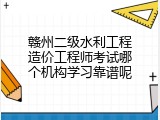赣州二级水利造价师培训
在水利工程建设日益发展的今天,专业人才的需求持续攀升,二级水利造价师作为项目成本管控的核心角色,其资格认证备受行业关注。赣州地区拥有丰富的水利资源与建设项目,许多从业者或意向人员都希望通过系统培训与考试获取这一证书,以提升职业竞争力与专业能力。面对市场上众多的培训机构,如何选择一个靠谱的学习平台成为关键问题。
这不仅涉及培训质量、师资力量、课程设置等核心因素,还需考虑机构的本地化服务、通过率数据以及学员评价等实际指标。一个优质的机构应能提供全面而深入的知识体系,结合实战案例与考试动态,帮助学员高效备考。相反,选择不当可能导致时间与金钱的浪费,甚至影响职业发展。
因此,在赣州地区寻求二级水利造价师培训时,需进行综合评估与谨慎比较,以确保投资于真正有价值的教育资源。
水利造价师职业概述与市场需求分析
水利造价师是水利工程建设中不可或缺的专业人才,主要负责项目预算、成本控制、招标投标、合同管理以及竣工结算等工作。
随着中国水利基础设施的持续投入,尤其是在赣州这样的地区,拥有丰富的水系资源和重点水利项目,如防洪工程、灌溉系统和电站建设,对二级水利造价师的需求日益旺盛。这一职业不仅要求从业人员具备扎实的工程造价基础知识,还需熟悉水利行业的特殊规范和政策法规。
二级水利造价师资格证书是由国家相关部门认证的专业资质,它不仅是个人专业能力的体现,更是职场晋升和薪资提升的重要砝码。在赣州,许多水利工程企业、设计院和政府部门在招聘时都优先考虑持证人员,因为这能确保项目成本的精确管理和合规性。市场需求分析显示,随着绿色水利和智慧水利的发展,对造价师的要求也在不断提高,包括数字化工具的应用和可持续发展理念的融入。
因此,获取这一证书不仅有助于个人职业发展,还能为地方水利建设贡献专业力量。
从就业前景来看,赣州作为江西省的重要城市,其水利行业正处于快速发展期。二级水利造价师的平均薪资水平较高,且职业稳定性强。市场需求不仅来自新建项目,还包括现有工程的维护和升级,这为持证人员提供了广阔的就业空间。
除了这些以外呢,这一职业还具有较强的行业交叉性,造价师可以轻松转型到其他建设领域,增强职业韧性。
二级水利造价师考试内容与难点解析
二级水利造价师考试通常分为多个科目,涵盖理论知识、实务操作和法规政策等方面。具体来说,考试内容包括水利工程造价基础、工程计量与计价、招标投标管理、合同法律知识以及相关水利工程技术规范。这些科目要求考生不仅掌握书本知识,还需具备实际应用能力,例如通过案例分析和计算题来检验解决问题的能力。
考试难点主要集中在以下几个方面:水利工程的专业性较强,涉及水文、地质、结构等交叉学科知识,这对于非水利背景的考生来说是一大挑战。计价与计量部分需要精准的数学计算和规范应用,稍有失误就可能导致错误。法规政策经常更新,考生必须及时跟进最新变化,否则容易在考试中失分。实务操作题往往基于真实项目场景,要求考生具备综合分析和决策能力,这需要通过大量练习来培养。
为了应对这些难点,考生需要制定科学的学习计划,注重基础知识的巩固,同时加强实战训练。
例如,可以通过模拟考试来熟悉题型和时间管理,或参加讨论小组以加深对复杂概念的理解。在赣州地区,由于本地水利项目的特点,考试内容可能会侧重地方规范和政策,因此选择培训时应注意机构的本地化适配性。
选择靠谱培训机构的评估标准
在选择赣州二级水利造价师培训机构时,需从多个维度进行评估,以确保学习效果和考试通过率。
下面呢是一些关键标准:
- 师资力量:优秀的培训机构应拥有经验丰富的讲师团队,包括持证专业人士、行业专家或前考官。师资的背景直接影响教学质量和知识深度,考生应优先选择那些提供讲师简历和学员反馈的机构。
- 课程设置:全面的课程体系应覆盖所有考试科目,并结合理论讲解、案例分析和模拟测试。机构是否提供灵活的学习模式,如面授、在线课程或混合式学习,也是一个重要考量点,尤其适合赣州地区的在职人员。
- 通过率数据:靠谱的机构通常会公布历史通过率或学员成功案例,这可以作为客观参考。高通过率往往意味着教学的有效性和针对性,但考生也需注意数据的真实性,避免被夸大宣传误导。
- 本地化服务:由于水利工程受地域影响较大,机构是否提供赣州本地政策解读、项目案例或实地考察机会,将显著提升学习实用性。
除了这些以外呢,课后支持如答疑服务、学习社群和更新资料也至关重要。 - 费用与性价比:培训费用应与提供的服务相匹配。考生需比较不同机构的收费模式(如一次性付费或分期),并考虑附加价值如教材质量、在线资源等,避免选择过于低廉但质量可疑的选项。
综合这些标准,考生可以通过试听课程、咨询往期学员或阅读独立评价来做出明智决定。记住,一个好的培训机构不仅仅是传授知识,更能帮助学员构建职业网络和持续学习的能力。
赣州地区培训市场现状与机构类型比较
赣州的二级水利造价师培训市场近年来逐渐成熟,呈现出多元化的机构类型,各有优缺点。总体来看,市场主要分为以下几类:大型全国性连锁机构、本地专业化培训学校、在线教育平台以及高校或行业协会提供的课程。
大型全国性连锁机构通常拥有标准化课程和丰富资源,师资力量较强,且能提供全国统一的模拟考试和资料。这类机构的优势在于系统性和可靠性,适合追求全面备考的学员。它们可能在本地化方面稍显不足,例如对赣州特定水利政策的覆盖不够深入,且费用较高。
本地专业化培训学校则更注重地域特色,讲师往往熟悉赣州的水利项目和实践案例,课程内容更贴近实际考试需求。这类机构通常提供小班教学或个性化辅导,通过率较高,但资源可能有限,例如在线支持较弱。对于赣州本地学员来说,这是一个值得考虑的选择,尤其是那些需要灵活学习时间的人群。
在线教育平台近年来兴起, offering flexibility and convenience through digital courses, live webinars, and mobile apps. These platforms are cost-effective and accessible, allowing students in Ganzhou to learn at their own pace. However, they may lack interactive elements and local relevance, making them better suited for self-disciplined learners who already have a basic understanding of the subject.
Lastly, courses offered by universities or industry associations often emphasize theoretical depth and professional ethics. They are usually more affordable and credible, but may not focus solely on exam preparation, requiring students to supplement with additional practice.
In summary, the Ganzhou market offers diverse options, and students should choose based on their individual needs, such as learning style, budget, and time availability. A comparative analysis shows that hybrid approaches—combining local insights with online resources—often yield the best results.
学习策略与备考建议 for 二级水利造价师考试
Effective preparation for the二级水利造价师考试 requires a structured learning strategy and practical tips. Here’s a comprehensive approach to help students in Ganzhou succeed:
- Develop a Study Plan: Create a detailed schedule that covers all exam subjects, allocating more time to difficult areas like engineering measurement and legal regulations. Break down goals into weekly tasks, and include revision periods to reinforce knowledge. Consistency is key—aim for regular study sessions rather than cramming.
- Utilize Multiple Resources: Besides textbooks, use online materials, video lectures, and practice apps. For Ganzhou students, incorporating local case studies and policy documents can enhance relevance. Join study groups or forums to exchange ideas and get support from peers.
- Focus on Practice: The exam heavily tests practical skills, so engage in numerous exercises and mock tests. Analyze past exam papers to identify common question patterns and time management techniques. Simulate exam conditions to build confidence and reduce anxiety.
- Stay Updated: Keep abreast of changes in水利行业 policies and standards, as these are frequently tested. Follow industry news and participate in webinars or workshops offered by training institutions.
- Maintain Health and Balance: Avoid burnout by incorporating breaks, physical activity, and healthy eating into your routine. A balanced approach improves concentration and long-term retention.
By adopting these strategies, students can increase their chances of passing the exam efficiently. Remember, choosing a reliable training机构 is part of this process, as it provides the guidance and resources needed to implement these tips effectively.
常见陷阱与避免方法 in 选择培训机构
When searching for a training机构 for the二级水利造价师 exam in Ganzhou, students often encounter several pitfalls that can lead to poor outcomes. Being aware of these traps and knowing how to avoid them is crucial for making an informed decision.
One common trap is falling for exaggerated advertising claims. Some institutions may promote "guaranteed pass rates" or "secret shortcuts" to attract students. However, these are often misleading, as no training can guarantee success without effort. To avoid this, always verify claims through independent reviews or by talking to past students. Look for transparent data and realistic promises.
Another trap is opting for the cheapest option without considering quality. Low-cost courses might skimp on resources, such as outdated materials or inexperienced instructors, ultimately costing more in terms of retakes and wasted time. Instead, evaluate the overall value—consider what is included in the fee, such as access to tutors, updated content, and additional support services.
Additionally, some students overlook the importance of localization. Institutions that only offer generic national courses may not address Ganzhou-specific exam content, putting local students at a disadvantage. Avoid this by choosing机构 that incorporate regional examples and policies into their curriculum.
Finally, be wary of inflexible learning options. For working professionals in Ganzhou, a rigid schedule might not be feasible, leading to dropout or incomplete preparation. Seek out机构 that offer flexible modes, like online modules or weekend classes, to ensure compatibility with your lifestyle.
By steering clear of these traps and conducting thorough research, students can select a training机构 that truly supports their goals, enhancing both exam performance and professional growth.
未来趋势与职业发展前景
The field of水利造价师 is evolving rapidly, influenced by technological advancements and industry trends. For students in Ganzhou pursuing二级水利造价师 certification, understanding these future directions can help in planning long-term career paths.
One major trend is the integration of digital tools, such as BIM (Building Information Modeling) and AI-based cost estimation software. These technologies are transforming how造价师 work, making processes more efficient and accurate. As a result, training programs that include digital literacy components will become increasingly valuable. Students should seek institutions that offer courses on these tools to stay competitive.
Another trend is the emphasis on sustainable and green水利工程. With growing environmental concerns, projects in Ganzhou and beyond are focusing on eco-friendly designs and cost management. This shift requires造价师 to have knowledge of sustainability standards and life-cycle costing. Future-proofing your career involves choosing training that covers these aspects.
In terms of career development, holding a二级水利造价师 certificate opens doors to various roles, from project manager to consultant. In Ganzhou, the ongoing investment in水利基础设施 ensures steady demand, with opportunities in both public and private sectors. Additionally, the skills gained are transferable to other regions or related fields like construction management, enhancing job mobility.
Overall, the future looks bright for二级水利造价师 professionals. By selecting a forward-thinking training机构 and continuously updating skills, students can not only pass the exam but also build a resilient and rewarding career in the dynamic水利行业.
In conclusion, the journey to becoming a certified二级水利造价师 in Ganzhou involves careful consideration of training options, a solid study strategy, and an eye on future trends. By making informed choices and avoiding common pitfalls, aspiring professionals can achieve their goals and contribute meaningfully to the region's水利建设.
